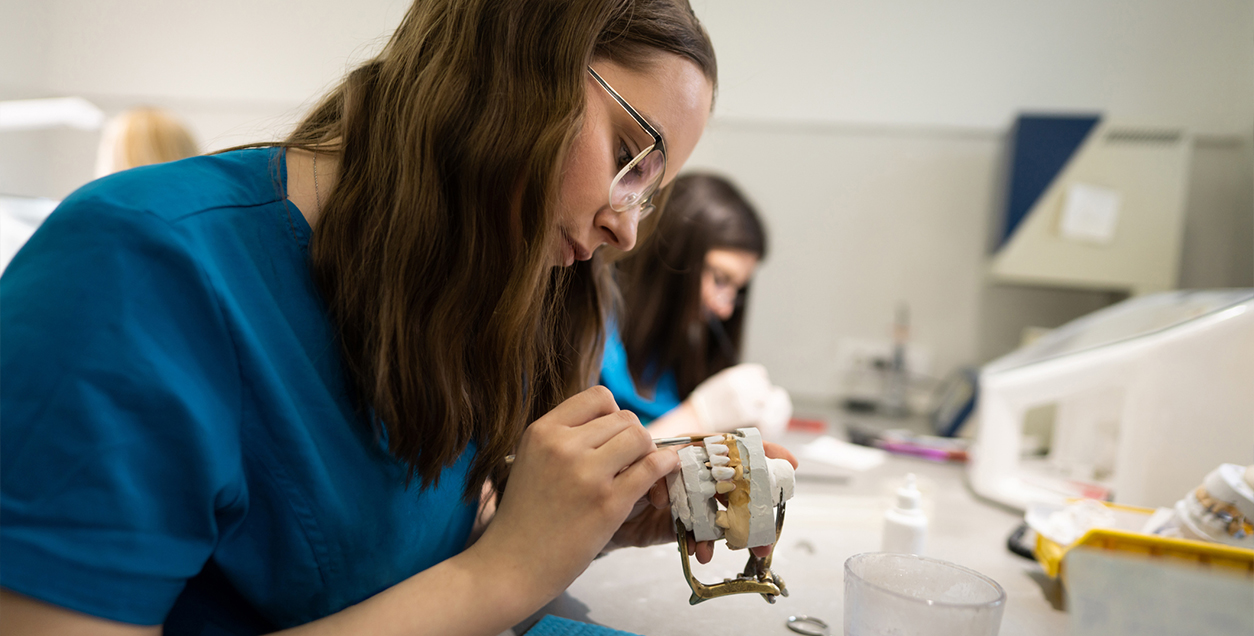It is my pleasure to welcome you to the Department of Restorative Sciences & Biomaterials at Boston University Henry M. Goldman School of Dental Medicine. We are thrilled to share with you our vibrant community and the exciting work taking place here.
At our Department, we are committed to advancing science through comprehensive education, high quality clinical work and innovative research. Our dedicated team strives to foster a collaborative environment that inspires creativity and excellence in students, faculty and staff. We invite you to explore our programs and discover how we are shaping the future of Restorative Sciences, Biomaterials and Applied Biomechanics:
Restorative Sciences is composed of two different Divisions, offering clinical residency training in Prosthodontics (3-year program), and Esthetics, Digital and Operative Dentistry (2-year program).
Prosthodontics: The 36-month program in fixed, removable, and implant prosthodontics provides the candidate with clinical proficiency and comprehensive knowledge of the diagnosis, treatment planning, rehabilitation, and maintenance of oral function, comfort, appearance, and health of patients with missing/damaged teeth and orofacial defects by using biocompatible artificial substitutes. The curriculum includes didactic and clinical instruction in complete dentures, removable partial dentures, fixed prosthodontics, implant dentistry, implant surgery, geriatrics, temporomandibular disorders, and maxillofacial prosthodontics. The didactic background and the clinical and laboratory skills of these areas of prosthodontics are stressed.
Esthetics, Digital and Operative Dentistry: This 24-month Certificate of Advanced Graduate Study (CAGS) program offers advanced education in the conceptual, biological, and practical components of esthetic, digital and operative dentistry. The curriculum includes didactic and clinical instruction in basic sciences, biomaterials, lecture presentations, research methods, and the clinical aspects of restorative dentistry. The clinical component of the program emphasizes on all aspects of conventional and digital dentistry, from diagnosis and treatment planning to successful patient rehabilitation.
Biomaterials and Applied Biomechanics offer research training in these two areas, which are very often interrelated.
Biomaterials and Applied Biomechanics: Our state-of-the-art laboratories are at the forefront of developing materials for computerized fabrication of restorations. Our faculty have developed new concepts and techniques for analyzing the interaction between biomaterials and cells at the molecular and genetic levels. We have strategically positioned ourselves to create, analyze, and test novel synthetic materials for tissue replacement and prosthetic therapy. Moreover, biomaterials and different clinical scenarios are tested using computational methods, in order to investigate treatment efficacy. The effect of dental treatments on patients’ posture and gait represents another area of focus of our research.
The primary functions of Biomaterials and Applied Biomechanics are:
- Conduct basic science and applied research.
- Train pre-doctoral and post-doctoral students in research methodology, biomaterials and applied biomechanics.
- Educate pre-doctoral and post-doctoral students with respect to novel materials and procedures that may improve patient care.
Integrated graduate programs are available for qualified students to combine their clinical specialty certificate programs with biomaterials or applied biomechanics research.
I thank you for your interest and I look forward to answering any questions you may have.
Konstantinos Michalakis, DDS, CAGS, MSc, MSc, PhD, FACP, FICD
Professor and Chair, Restorative Sciences and Biomaterials
